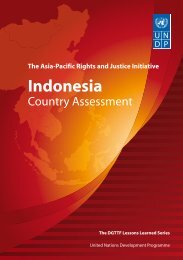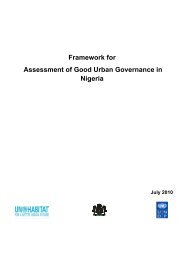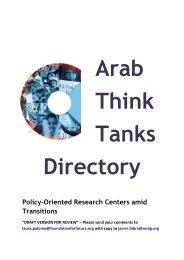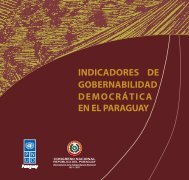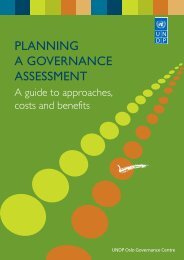A Users' Guide to Measuring Local Governance
A Users' Guide to Measuring Local Governance
A Users' Guide to Measuring Local Governance
You also want an ePaper? Increase the reach of your titles
YUMPU automatically turns print PDFs into web optimized ePapers that Google loves.
Table 5:<br />
Scale <strong>to</strong> assess local governance<br />
Value<br />
<strong>Governance</strong><br />
Performance<br />
+1 Perfect<br />
+0.75 Very Good<br />
+0.5 Good<br />
+0.25 Fairly Good<br />
0 Neutral<br />
-0.25 Fairly Poor<br />
-0.5 Poor<br />
-0.75 Very Poor<br />
-1 Non-existent<br />
Gender focus<br />
The LGB includes an equity criterion, while it could<br />
also include sub-criteria with a gender perspective<br />
under each theme. In addition, recommendations<br />
are made in respect <strong>to</strong> the inclusion of a gender<br />
balance in the sample <strong>to</strong> be interviewed.<br />
Poverty focus<br />
The LGB is focused on poverty as it assesses the<br />
access <strong>to</strong> services for different groups in society<br />
and can be used as part of the process of localising<br />
the Millennium Development Goals, and so <strong>to</strong><br />
reduce poverty.<br />
Strengths<br />
• The LGB integrates quantitative data with<br />
qualitative observations. It comes with a<br />
user-friendly interface based on a common<br />
database, spreadsheets and a word-processing<br />
software.<br />
• The LGB allows the comparison of results<br />
between stakeholder groups (contributing <strong>to</strong><br />
very interesting dialogues between stakeholders<br />
why they perceive elements of governance<br />
differently), between municipalities and over<br />
time.<br />
• It can be easily adapted <strong>to</strong> specific situations<br />
and contexts: it is applicable <strong>to</strong> national,<br />
regional or local administrative levels and it<br />
can be adapted <strong>to</strong> different themes and<br />
sec<strong>to</strong>rs (such as decentralisation, environment,<br />
public service provision, etc.)<br />
• The LGB thus finds the right balance between<br />
comparability and local specificity. In practice<br />
most applications use a model that is specific<br />
for a certain country as most practices,<br />
procedures and standards are defined at that<br />
level (applications in a federal system might<br />
have <strong>to</strong> go one level lower).<br />
• It can be applied in situations in which reliable<br />
baseline and performance data are lacking but<br />
also in settings where such data are<br />
abundantly available. Recent applications of<br />
the LGB in combination with Citizen/<br />
Community Report Cards exercises turned out<br />
<strong>to</strong> be very successful.<br />
• The LGB is a participa<strong>to</strong>ry <strong>to</strong>ol that involves<br />
representatives from all sections of society<br />
throughout the process, enhancing dialogue<br />
and building consensus among the various<br />
ac<strong>to</strong>rs. In addition, it uses contextualised<br />
indica<strong>to</strong>rs that speak <strong>to</strong> the local population.<br />
Both fac<strong>to</strong>rs contribute <strong>to</strong> a high level of local<br />
ownership. It is action oriented and therefore<br />
an assessment and capacity building <strong>to</strong>ol at<br />
the same time, creating understanding and<br />
improved cooperation between stakeholders<br />
in local governance settings.<br />
• From a cost-benefit perspective, the instrument<br />
can be applied in a resource poor setting<br />
(resulting in lower levels of reliability and<br />
representation) or in situations that require<br />
higher levels of reliability and therefore more<br />
intensive primary data collection thus increasing<br />
the costs of the application.<br />
• Since 2008, the localised specific model can be<br />
easily translated in<strong>to</strong> a web-based version,<br />
making instant scoring and feedback <strong>to</strong> the<br />
various stakeholder groups possible.<br />
Weaknesses<br />
• It requires a lead agent that is conversant with<br />
the methodology and trained and approved by<br />
the Impact Alliance. The agent needs <strong>to</strong> have a<br />
good understanding of governance in the local<br />
context in order <strong>to</strong> be able <strong>to</strong> localise the<br />
instrument successfully.<br />
• It requires a minimal technical support from<br />
Impact Alliance <strong>to</strong> translate the localised model<br />
in<strong>to</strong> a web-based model for instant scoring.<br />
A Users’ <strong>Guide</strong> <strong>to</strong> <strong>Measuring</strong> <strong>Local</strong> <strong>Governance</strong> 63




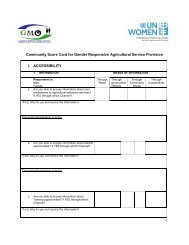
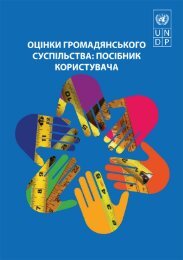
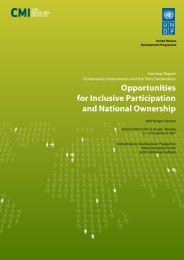
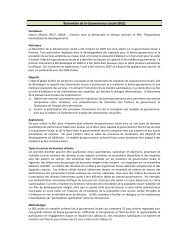
![GuÃa del Usuario ] - Governance Assessment Portal](https://img.yumpu.com/44740603/1/190x253/gua-a-del-usuario-governance-assessment-portal.jpg?quality=85)
